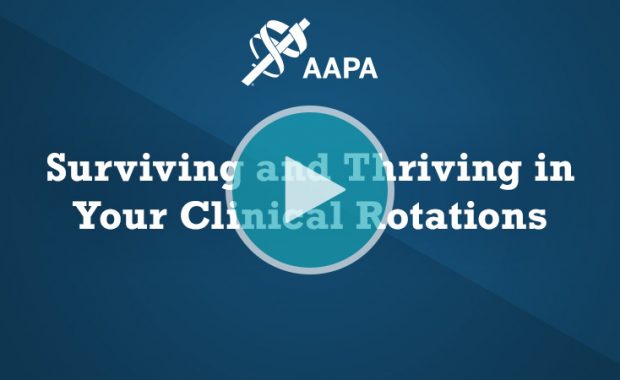Career Resources
Specialty Transitions: Researching the Best Options for You
PA Career Coach Jennifer Hohman frequently works with clients who are considering changing their specialty. Find out how she helps her clients find the right specialty for them through careful self-assessment, research, and networking.
Contract Assessment and Negotiation Checklist
It’s important to negotiate a contract that empowers you, fits your needs, and protects you. The checklist can help you assess an employer’s contract and identify areas for negotiation.
Tips for Contract Negotiation, Using the AAPA Salary Report
Every day, PA Career Coach Jennifer Hohman uses the AAPA Salary Report to help her clients negotiate their employment contracts. In this article, Jennifer shares how she leverages the Salary Report for her client’s benefit.
Contract and Salary Negotiations
: You’ve landed your first PA job – now it’s time get the salary and perks you want! PA educator James R. Kilgore, DMSc, PhD, PA-C, DFAAPA, shares tips and tricks for negotiating the terms of your contract.

Your Top 5 Career Questions Answered by the PA Career Coach
Jennifer Anne Hohman, the PA Career Coach, answers the top five questions we heard from PAs this year. She offers her expert advice on asking for a raise, negotiating (and renegotiating) your salary, how to land a job as a new grad, and more.

How to Tailor Your Job Application for a Specialty Transition
Any successful career transition is rooted in self-knowledge, curiosity and a zestful movement towards what inspires you as a clinician. PAs have unique career journeys given their ability to navigate specialty transitions that can be both exciting and daunting.
Putting on Your Oxygen Mask: The Importance of Taking Care of Your Mental Health to Succeed in PA School
Mental health affects everyone from PA students to practicing PAs. Join AAPA for this webinar featuring a discussion on mental health. Learn what you can do now to and as you prepare for your PA career to take care of yourself!

AOP Guide
Explore a new career direction or specialty with this collection of AAPA and partner resources, salary data, and CME on various practice areas, including Administration, Dermatology, Education, Emergency Medicine, Family Medicine, Hospital Medicine, Internal Medicine, Orthopaedic Surgery, Telemedicine, and Urgent Care.

Surviving and Thriving in Your Clinical Rotations
Get an overview of helpful tips and pearls of wisdom for students entering the clinical phase of their education. Learn how to study during clinicals, how to elicit and act on feedback, and ultimately maximize the clinical experience.

4 Non-Salary Negotiations PAs Need to Consider
For most professionals, the words “negotiate” and “salary” often go hand-in-hand. But when employers can’t increase your salary offer, you may find them willing to increase or improve other areas of the benefits package to entice you to work for them.

Sponsored
Why I Changed Specialties as a PA
One of the major advantages of becoming a PA is that it is relatively easy to change from one specialty to another without the need for new certification. More than 50% of PAs will change specialties during their careers, according to AAPA’s Salary Report.
Tackling Clinical Rotations
Conquer clinical rotations! Learn common do’s and don’ts with our video and get even more helpful and detailed tips with our guide.

Anatomy of a Contract
Use our interactive tool to familiarize yourself with a contract. We’ve outlined the key elements typically found in PA employment contracts and offered some advice on what to expect, ask for, and be wary of in each section.
5 Tips for Surviving Your Clinical Rotations
Program directors share collected wisdom to ensure you make it through your clinical phase, plus student resources to help you along the way.
Strategies for PAs to Prevent Burnout
While work/life balance will always be provisional and imperfect, it is worth seeking; it is essential PAs take care of themselves to prevent professional and personal burnout.

